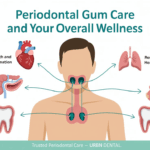We describe the important things to understand before getting a tooth extraction in Houston, TX.
The teeth play a crucial role in your general health and life. Most of us try to preserve our teeth as best we can — but, in some cases, it may be necessary to get a tooth removed. There can be several reasons to opt for a tooth extraction near me — impacted wisdom teeth, the risk of harming other teeth, etc. However, you should only consider a tooth extraction if that’s the only way to protect your overall oral health. This article describes the important things to understand before getting a tooth extraction in Houston, TX.When do you need a dental extraction?
The most common reason for tooth extraction is the presence of impacted wisdom teeth. The wisdom teeth are the third molars at the back of the mouth — they usually come out in one’s late teenage years or early 20s. By the time your wisdom teeth erupt, your jaws may already be set in place. As such, the growth of wisdom teeth may lead to several problems, such as gum inflammation, overcrowding, etc. Most people need to get wisdom dental extraction at some point in their lives — fortunately, the wisdom teeth don’t serve any purpose, so you’re better off without them. Other than wisdom teeth removal, you may also need dental extraction for several other reasons. Some of the most common reasons for tooth removal are excessive dental decay, tooth infection, and overcrowding of teeth. Tooth decay can usually be stopped at an early stage if you get a filling or root canal — but if you don’t go for regular dental exams, you won’t even realize you have tooth decay until it’s too late. Tooth extraction may also be necessary for people who are getting braces — removing a tooth may provide enough space in your jaws for the other teeth to evenly spread out. A dental extraction is a viable option for people going through chemotherapy or an organ transplant. In these cases, a compromised tooth has to be removed to maintain overall oral health. The following is a brief summary of possible reasons for a dental extraction:- Severely damaged or cracked teeth.
- Excessive dental decay that can’t be treated with fillings or root canals.
- Creating enough space in your mouth for perfect alignment.
- Preparing for orthodontic treatments.
- Removing an impacted wisdom tooth.
- Allowing permanent teeth to come out properly if the baby teeth aren’t falling out.
- Treating excessive bacterial decay or infection.
How to prepare for a tooth extraction?
Before the tooth extraction, the dentist will take x-rays of your teeth. During the consultation, you should inform the dentist about your medical history and all ongoing supplements, medications, vitamins, and over-the-counter drugs. No matter how trivial the detail may seem, convey all the information to your dentist. You should also inform the dentist if you’re going to soon have another medical procedure that may involve an intravenous drug called bisphosphonate. The dental extraction must be accomplished before the drug treatment. The following is an overview of medical conditions that you should mention: diabetes, liver disease, hypertension, adrenal disease, bacterial endocarditis, congenital heart defect, thyroid disease, artificial joint problems, renal disease, damaged heart valves, or an impaired immune system. The dentist will have to ensure that all your conditions are stable before they proceed with a dental extraction. Depending on your conditions and the type of tooth extraction necessary, the dentist may also prescribe antibiotics. The following are some preparatory tips before the tooth extraction procedure:- Wear loose-fitting clothes or short-sleeves because you may receive intravenous (IV) anesthesia.
- Don’t eat or drink anything six to eight hours prior to the procedure.
- Don’t smoke before or after the treatment.
- Reschedule the procedure if you have a cold.
- Inform the doctor if you have nausea or vomiting.
- Arrange for someone to drive you back from the clinic after the procedure.
What is the procedure for a tooth extraction?
There are two types of procedures for tooth extraction — simple extraction and surgical tooth extraction. A simple extraction is a simple procedure. You receive an anesthetic that numbs the region around your tooth, so there’s no pain or discomfort. The dentist uses a device called an elevator to loosen the tooth and then extracts it with a pair of forceps. A surgical extraction is necessary for impacted teeth. The dentist administers local anesthesia and intravenous anesthesia to minimize sensation and help calm you down. In some cases, you may also be given general anesthesia, depending on your level of discomfort. The emergency dentist or surgeon creates small incisions on your gums, removes some of the bone around the tooth, slices the tooth into smaller fragments, and then extracts them. After the extraction, the incisions are sutured back.How much does a tooth extraction cost?
The cost of a tooth extraction depends from one situation to the next. The cost varies depending on the location of the tooth, the type of extraction necessary, the anesthesia used, and the geographical location of the clinic. Generally speaking, the cost of a simple extraction ranges from $75 and $200 per tooth, while the cost of a surgical tooth extraction ranges from $800 and $4,000 per tooth.Contact a dentist for tooth extraction today.
URBN Dental is one of the most reputable dental clinics for tooth extraction in Houston, TX. During your consultation, our dentist examines your teeth carefully, and we only recommend tooth extraction if there’s no other option. For more information, please schedule an appointment with our dentist’s office near me today.URBN Dental Services in Houston, TX
Houston | Katy | Montrose | West University Place | Greater Third Ward | Greater East End | North East Houston | Houston Heights | Central Northwest | Fairbanks | Acres Home | East Houston | Southeast Houston | Central Southwest | Fort Bend Houston | Brays Oaks | Meyerland Area | Sharpstown | Alief | Westchase | Memorial | Northwest Houston | Katyland | Whispering Lakes | Pine Lakes | Woodcreek Reserve















